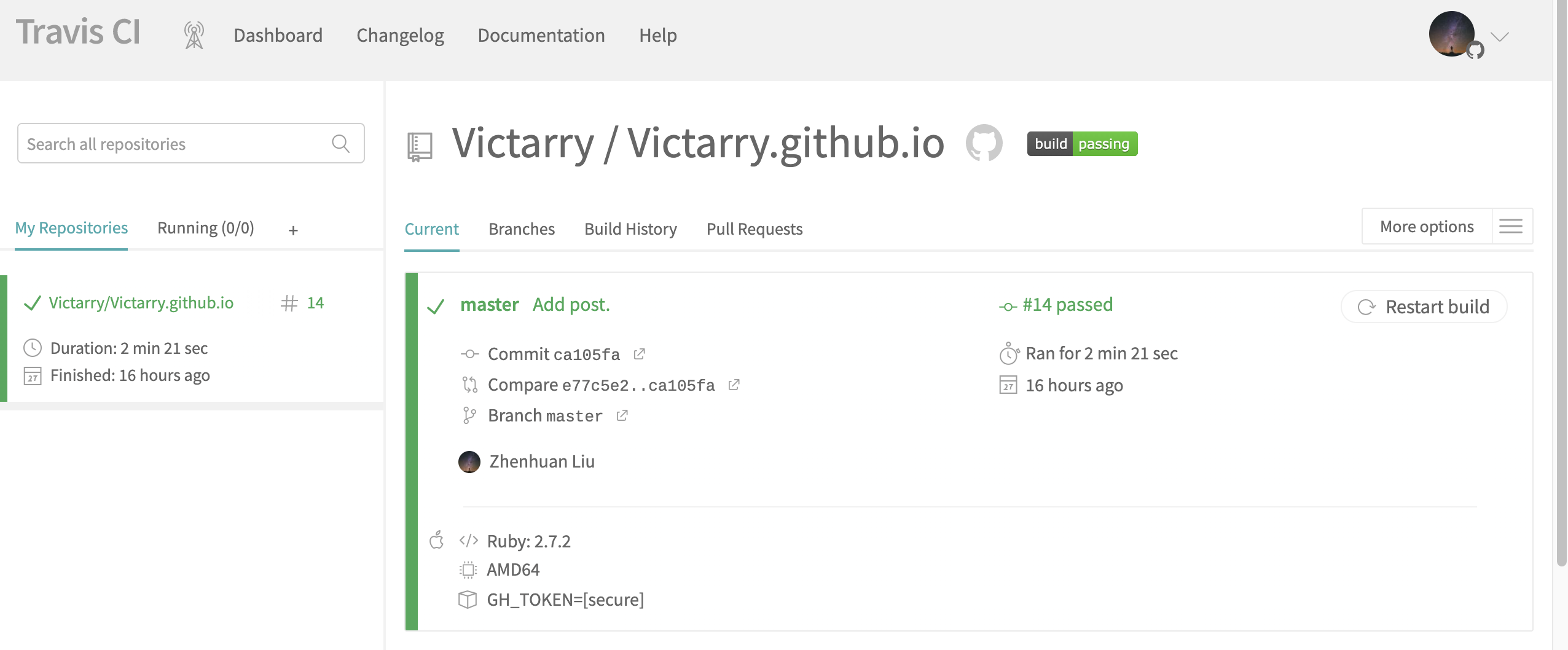使用AsciiDoc在Github-Pages上搭建博客
本文介绍了如何使用AsciiDoc代替Markdown写文章,并通过 Travis-ci 将AsciiDoc生成为html,最后发布到Github-Pages上.
由于没有找到详细介绍AsciiDoc构建Github-Pages的中文资源, 因此本文记录了笔者关于搭建博客的整个过程.
1. 为什么要使用AsciiDoc?
AsciiDoc和Markdown一样,是一种轻量级标记语言,用于简单的文章排版和页面生成.
Markdown虽然方便,但功能相对较少,不如AsciiDoc强大. Wikipedia列举了 不同标记语言的对比 ,可以看出AsciiDoc是功能最完善的标记语言之一.
AsciiDoc官方列举了AsciiDoc和markdown的对比 ,其中AsciiDoc相对于Markdown的优势有:
-
相同标记场景下, AsciiDoc用的字符数要比Markdown更少.
-
AsciiDoc的格式更加统一.
-
AsciiDoc可以处理任意排列的inline嵌套格式,而Markdown经常难以处理.
-
AsciiDoc可以处理一些Markdown无法处理的场景, 例如单词内的标记, Block-level源代码和block-level images.
与markdown一样的是,Github仓库预览时支持AsciiDoc, 也就是说在github写README,wiki和gist时可以使用AsciiDOc.
但是,Github-Pages官方不支持AsciiDoc的Jekyll插件, 因此无法直接上传AsciiDoc文件生成Github-Pages网站,但我们可以用 Travis 自动build的工具生成asciidoc对应的html文件.
2. AsciiDoc+Jekyll博客本地配置
2.1. Jekyll安装
-
安装ruby, 下载链接
-
安装Jekyll并新建网站
~ $ gem install bundler jekyll ~ $ jekyll new my-awesome-site ~ $ cd my-awesome-site ~/my-awesome-site $ bundle exec jekyll serve
-
用浏览器打开 http://localhost:4000 查看博客
2.2. Jekyll文件结构
在 my-awesome-site 文件夹下面,可以看到运行 jekyll new my-awesome-site 初始化生成的所有文件.
├── 404.html
├── Gemfile (1)
├── Gemfile.lock
├── _config.yml (2)
├── _posts (3)
│ └── 2021-02-17-welcome-to-jekyll.markdown
├── about.markdown (4)
└── index.markdown (4)-
配置所需要的包和依赖, 例如Jekyll本身的包
-
关于博客网站级别的配置,例如网站theme, baseurl和相关插件
-
所有在
_posts文件夹下的markdown文件都会作为Post类型的页面来渲染. -
所有在根目录下的markdown文件都会作为Page类型的页面来渲染
Jekyll通过将markdown文件渲染成静态html文件来生成博客网站的主体内容,其中页面分为两个类别, 分别是Page和Post
-
Pages是Jekyll中用于撰写内容的最基本单元, Pages适合用于单独的内容, 也就是与日期无关并且不是成组的内容.
如果要添加一个新的Page, 只需要在根目录下添加一个新的HTML文件或者Markdown文件, 例如包含了about, index和contact页面的文件及其对应的URL如下:
.
├── about.md # => http://example.com/about.html
├── index.html # => http://example.com/
└── contact.html # => http://example.com/contact.html
-
Posts正如博客中的文章,可以方便记录书写时间,并且统一展示起来. 与Pages同样, 既可以使用HTML,也可以使用Markdown, 需要注意的是文件必须命名为
YYYY-MM-DD-title-of-post.markdown.
2.3. AsciiDoc安装配置
Jekyll可以直接支持Markdown的渲染, 为了使用AsciiDoc代替Makrdown, 我们要使用Jekyll-AsciiDoc的插件
2.3.1. 在Gemfile中添加Jekyll-AsciiDoc的依赖
在 Gemfile 中找到 group :jekyll_plugins do , 并加入 gem 'jekyll-asciidoc',
得到如下 Gemfile 文件:
source "https://rubygems.org" # Hello! This is where you manage which Jekyll version is used to run. # When you want to use a different version, change it below, save the # file and run `bundle install`. Run Jekyll with `bundle exec`, like so: # # bundle exec jekyll serve # # This will help ensure the proper Jekyll version is running. # Happy Jekylling! gem 'jekyll', '~> 3.8.3' # This is the default theme for new Jekyll sites. You may change this to anything you like. gem "minima" # If you want to use GitHub Pages, remove the "gem "jekyll"" above and # uncomment the line below. To upgrade, run `bundle update github-pages`. # gem "github-pages", group: :jekyll_plugins # If you have any plugins, put them here! group :jekyll_plugins do gem 'jekyll-asciidoc' end
2.3.2. 激活jekyll-asciidoc插件(可选)
修改 _config.yml 文件, 找到 plugins: , 添加 jekyll-asciidoc , 从而激活asciidoc插件
plugins: - jekyll-asciidoc
由于jekyll会自动激活 :jekyll_plugins 组中的插件,因此该步骤也可以省略.
2.3.3. 重新生成jekyll网站
运行以下命令
bundle install
bundle exec jekyll serve --livereload # --livereload可以自动更新页面在根目录或者 _posts 下添加 .adoc 文件,就可以看到新生成的页面.
这样,就可以用AsciiDoc代替Markdown来写Pages或者Posts了,只需要用 .adoc 文件替换 .md 文件.
至此,就成功在本地使用AsciiDoc撰写个人博客网站了,下一部分内容会讲述如何将博客通过Github-Pages发布到互联网上.
2.4. jekyll和AsciiDoc参考链接
-
AsciiDoc Vscode插件, 可以直接预览AsciiDoc文件
-
AsciiDoc Writing Guide, 快速上手AsciiDoc
-
AsciiDoc Documentation, AsciiDoc详细介绍
-
AsciiDoc语法查询手册, 可以快速查询AsciiDoc对应的语法
-
jekyll Documentation, jekyll详细介绍
-
jekyll-AsciiDoc插件, 用于在jekyll中使用AsciiDoc
-
jekyll-AsciiDoc-Quickstart, 可以直接在github上Fork, 相当于使用配置好的AsciiDoc-jekyll网站,这样就不需要从头开始,并且手动修改关于AsciiDoc的相关配置了.
3. Github-Pages配置
-
新建一个仓库,仓库名设置为
USERNAME.github.io, github会自动为该repo启用github-pages -
将新建的网站文件夹加入git, 并push到github远程仓库上
~/my-awesome-site $ git init ~/my-awesome-site $ git add --all ~/my-awesome-site $ git commit -m "First commit" ~/my-awesome-site $ git remote add git@github.com:USERNAME/USERNAME.github.io ~/my-awesome-site $ git push -u origin master
详细可参考 Github-Pages官方教程, 但不需要启用github-pages的gem包.
-
之后就可以在 https://USERNAME.github.io 上查看新建的博客, 对于markdown写的文章,可以正确渲染. 但对于AsciiDoc写的文章,无法正确查看. 由于 Github-Pages没有将
jekyll-AsciiDoc的插件加入到白名单中, 因此我们需要采用CI来完成AsciiDoc文件的渲染.
4. 使用CI进行构建和上传
Method 1. 使用Github Actions进行自动构建 (推荐)
在`USERNAME.github.io`的repo下面,新建``.github/workflows`文件夹, 并新建文件`github-pages.yml`文件并填入:
name: Build and deploy Jekyll site to GitHub Pages
on:
push:
branches:
- master
jobs:
github-pages:
runs-on: ubuntu-latest
steps:
- uses: actions/checkout@v3
- uses: actions/cache@v2
with:
path: vendor/bundle
key: ${{ runner.os }}-gems-${{ hashFiles('**/Gemfile') }}
restore-keys: |
${{ runner.os }}-gems-
- uses: helaili/jekyll-action@v2
with:
token: ${{ secrets.GITHUB_TOKEN }}
pre_build_commands: apk --update add python3然后,在github上对应的repo → setting → Options → Github-Pages中设置branch为 gh-pages 并save.
关于github actions的详细内容,参见 github actions docs.
Method 2. 使用Travis配置
我们可以通过Travis-CI调用Rake-jekyll来构建jekyll网站并上传到对应的仓库中.
4..1. 配置Rake-jekyll
-
将
gem 'rake-jekyll', '~> 1.1.0'加入到Gemfile中 -
新建
Rakefile文件, 并将下面内容复制到其中require 'rake-jekyll' # This task builds the Jekyll site and deploys it to a remote Git repository. # It's preconfigured to be used with GitHub and Travis CI. # See http://github.com/jirutka/rake-jekyll for more options. Rake::Jekyll::GitDeployTask.new(:deploy) do |t| t.committer = 'Jekyll Publisher <jekyll@example.com>' t.deploy_branch = 'gh-pages' end -
重新安装依赖
bundle install -
我们可以直接运行
bundle exec rake deploy来将渲染好的网站push到github远程仓库中的gh-pages分支上. -
在github上对应的repo → setting → Options → Github-Pages中设置branch为
gh-pages并save. -
我们再次打开 https://USERNAME.github.io , 就可以看到使用AsciiDoc撰写的文章了
但这样每次更新博客都要手动调用 bundle exec rake deploy , 我们可以通过Travis-CI帮我们自动完成这一任务.
4..2. 配置Travis-CI
-
登录 https://travis-ci.com/ 网站, 使用github账号登录并且进行Permission的授权
-
在 https://travis-ci.com/account/repositories 中进行 sync, 将对应的 repo 加入到Travis-CI管理的项目中.
-
新建
.travis.yml文件, 将以下内容复制到文件中language: ruby rvm: 2.7.2 os: osx before_install: - gem install bundler install: bundle install --deployment script: bundle exec rake deploy
我的电脑系统为MacOS Big Sur, 为了保持环境一致设置了
os: osx, 也可以设置为os: linux等, 但不同情况可能会遇到不同的问题, 注意看错误信息 . -
安装travis
gem install -n /usr/local/bin travis
-
在 https://github.com/settings/tokens/new 中生成新的token, 可以设置合适的权限
-
将github token加密写入到
.travis.yml文件中travis encrypt GH_TOKEN=<above token> --add env.global --com
(这一步可能需要使用命令行登录)
-
将所有文件更新commit并且push到github上
-
在 https://travis-ci.com/ 中查看build的log

-
build成功的话就可以在 https://USERNAME.github.io 中看到生成的网站
5. 其他问题
5.1. 显示latex公式
5.1.1. 添加mathjax link
-
新建_includes/mathjax.html, 并将下列代码复制到文件中
<script type="text/x-mathjax-config"> MathJax.Hub.Config({ messageStyle: "none", tex2jax: { inlineMath: [["\\(", "\\)"]], displayMath: [["\\[", "\\]"]], ignoreClass: "nostem|nolatexmath" }, asciimath2jax: { delimiters: [["\\$", "\\$"]], ignoreClass: "nostem|noasciimath" }, TeX: { equationNumbers: { autoNumber: "none" } } }); </script> <script src="https://cdnjs.cloudflare.com/ajax/libs/mathjax/2.7.4/MathJax.js?config=TeX-MML-AM_HTMLorMML"></script> -
在layout模板中的
<body> </body>内include上述文件, 如果添加到default的layout中, 那么可以新建_layouts/default.html, 复制下列代码<!DOCTYPE html> <html lang="{{ page.lang | default: site.lang | default: "en" }}"> {%- include head.html -%} <body> {%- include mathjax.html -%} {%- include header.html -%} <main class="page-content" aria-label="Content"> <div class="wrapper"> {{ content }} </div> </main> {%- include footer.html -%} </body> </html>
5.1.2. 在AsciiDoc中添加公式
-
启用stem, 在 metadata 中加入:
:stem:
-
使用行内公式(inline formula)
stem:[C = \alpha + \beta Y^{\gamma} + \epsilon] -
使用块公式(block formula)
[stem] ++++ C = \alpha + \beta Y^{\gamma} + \epsilon ++++
5.2. 代码高亮
-
在
Gemfile中添加pygments依赖gem 'pygments.rb', '~> 2.1.0'
-
在
_config.yml中添加下列代码asciidoctor: attributes: - idprefix=_ - source-highlighter=pygments - pygments-css=class - pygments-stylesheet=css/asciidoc-pygments.css
-
在theme对应的template中的
<head></head>tag下加入asciidoc-pygments.css作为stylesheet<link href="/css/asciidoc-pygments.css" rel="stylesheet">
5.3. Mardown和Asciidoc转换工具
6. Further Reading
6.1. 静态网站
6.2. 博客发布平台
-
Medium
6.3. 动态网站
-
WordPress